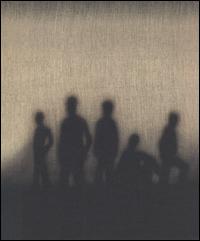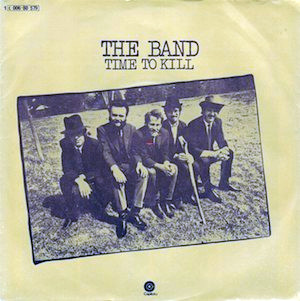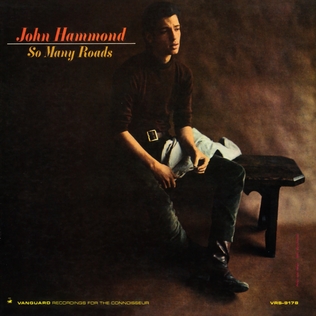Related Research Articles

The Band was a Canadian-American rock band formed in Toronto, Ontario, in 1967. It consisted of Canadians Rick Danko, Garth Hudson, Richard Manuel, Robbie Robertson, and American Levon Helm. The Band combined elements of Americana, folk, rock, jazz, country, and R&B, influencing musicians such as George Harrison, Elton John, the Grateful Dead, Eric Clapton and Wilco.

Jericho is the eighth studio album by Canadian-American rock group the Band. Coming seventeen years after their "farewell concert", it was released in 1993 and was the first album to feature the latter-day configuration of the group, as well as their first release for the Rhino subsidiary Pyramid Records.

Jubilation is the tenth and final studio album by Canadian/American rock group the Band. Recorded in the spring of 1998 in Levon Helm's home studio in Woodstock, New York, it was released on September 15, 1998. For the first time since the group reformed without guitarist and songwriter Robbie Robertson, there were more originals than covers. Songs include "Last Train to Memphis", featuring guest guitarist Eric Clapton, Garth Hudson's solo instrumental closer "French Girls", Rick Danko's "High Cotton" and the ode to Ronnie Hawkins, "White Cadillac".

Across the Great Divide is a box set by Canadian-American rock group the Band. Released in 1994, it consists of two discs of songs from the Band's first seven albums, and a third disc of rarities taken from various studio sessions and live performances. The set is now out of print, having been replaced by the five-CD/one-DVD box set A Musical History that was released in September 2005.

A Musical History is the second box set to anthologize Canadian-American rock group the Band. Released by Capitol Records on September 27, 2005, it features 111 tracks spread over five compact discs and one DVD. Roughly spanning the group's journey from 1961 to 1977, from their days behind Ronnie Hawkins and Bob Dylan through the departure of Robbie Robertson and the first disbanding of the group. The set includes highlights from each of the group's first seven studio albums and both major live recordings and nearly forty rare or previously unreleased performances.
"Acadian Driftwood" is a song by the Band. It was the fourth track on their sixth studio album Northern Lights – Southern Cross (1975), written by member Robbie Robertson. Richard Manuel, Levon Helm and Rick Danko trade off lead vocals and harmonize on the chorus.

"Stage Fright" is the title track of the Band's third album, Stage Fright. It features Rick Danko on lead vocals and was written by Robbie Robertson. According to author Barney Hoskyns, Robertson originally intended it to be sung by Richard Manuel but it became clear that the song was better suited to Danko's "nervous, tremulous voice."
"It Makes No Difference" is a song written by Robbie Robertson and sung by Rick Danko that was first released by The Band on their 1975 album Northern Lights – Southern Cross. It has also appeared on live and compilation albums, including the soundtrack to the film The Last Waltz. Among the artists that have covered the song are Solomon Burke, My Morning Jacket, Trey Anastasio and Over the Rhine.

"The Shape I'm In" is a song by The Band, first released on their 1970 album Stage Fright. It was written by Robbie Robertson, who did little to disguise the fact that the song's sense of dread and dissolution was about Richard Manuel, the song's principal singer. It became a regular feature in their concert repertoire, appearing on their live albums Rock of Ages, Before the Flood, and The Last Waltz. Author Neil Minturn described the song as "straightforward rock." Along with "The Weight," it is one of the Band's songs most performed by other artists. It has been recorded or performed by Bo Diddley, The Good Brothers, The Mekons, The Pointer Sisters, She & Him, Marty Stuart and Nathaniel Rateliff and the Night Sweats.

"Rag Mama Rag" is a song by The Band which was first released on their 1969 album The Band. It was also released as a single, reaching #16 on the UK Singles Chart, the highest position for any single by the group. The single was less successful in the US, reaching only #57 on the Billboard Hot 100.
"Sleeping" is a song by The Band, first released on their 1970 album Stage Fright. It was also released as the B-side to the "Stage Fright" single. It was co-written by Robbie Robertson and Richard Manuel. This and “Just Another Whistle Stop” are the only two songs Manuel receives credit for on the album. Music critic Barney Hoskyns rates it as "one of Richard [Manuel's] liveliest performances" and "one of The Band's most intricate arrangements." The Band never featured the song on a live album.
"Daniel and the Sacred Harp" is a song written by Robbie Robertson that was first released by The Band on their 1970 album Stage Fright. It has been covered by such artists as Barrence Whitfield.
"When You Awake" is a song written by Robbie Robertson and Richard Manuel that was first released on The Band's 1969 self-titled album The Band. A live performance was included on the Bob Dylan and The Band live album Before the Flood.

"Whispering Pines" is a song written by Richard Manuel and Robbie Robertson that was first released by The Band on their self-titled 1969 album The Band. It was released as a single in France, backed by "Lonesome Suzie".

"Ophelia" is a song written by Robbie Robertson that was first released by The Band on their 1975 album Northern Lights – Southern Cross. It was the lead single from the album. It has also appeared on several of the group's live and compilation albums, and has been covered by such artists as Vince Gill and My Morning Jacket.

"Time to Kill" is a song written by Robbie Robertson that was first released by the Band on their 1970 album Stage Fright. It was also released as a single off the album, backed with the more famous "The Shape I'm In" and, although it failed to reach the Top 40 in the United States, it peaked at #13 in the Netherlands. It has also been featured on several Band compilation and live albums.
"The W.S. Walcott Medicine Show" is a song written by Robbie Robertson that was first released on the Band's 1970 album Stage Fright. It was also frequently performed in the group's live sets and appeared on several of their live albums. Based on Levon Helm's memories of minstrel and medicine shows in Arkansas, the song has been interpreted as an allegory on the music business. Garth Hudson received particular praise for his tenor saxophone playing on the song.
"The Unfaithful Servant" or "Unfaithful Servant" is a song written by Robbie Robertson that was first released by The Band on their 1969 album The Band. It was also released as the B-side of the group's "Rag Mama Rag" single. It has also appeared on several of the Band's live and compilation albums.

So Many Roads is a 1965 studio album by John P. Hammond, backed by several musicians who would go on to form The Band.

The Night They Drove Old Dixie Down: The Best of the Band Live in Concert is a 1990 compilation of live recordings from American roots rock group the Band released by CEMA Special Markets.
References
- 1 2 3 4 5 6 7 8 Hoskyns, Barney (2006). Across the Great Divide. Hal Leonard. pp. 184, 209, 233, 248. ISBN 9781423414421.
- 1 2 3 4 5 6 DeRiso, Nick (24 October 2013). "Across the Great Divide: The Band, "Jemima Surrender" from The Band (1969)". Something Else!. Retrieved April 23, 2017.
- 1 2 3 4 5 6 7 8 Aaron, Peter (2016). The Band FAQ. Backbeat Books. p. 43. ISBN 9781617136139.
- ↑ Millward, Steve (2014). Different Tracks: Music and Politics in 1970. Troubador. p. 117. ISBN 9781783064762.
- 1 2 3 Harris, Craig (2014). The Band: Pioneers of Americana Music. Rowman & Littlefield. pp. 98–99. ISBN 9780810889040.
- 1 2 3 "The Band: The Brown Album". The Band. Retrieved April 23, 2017.
- ↑ Leng, Simon (2003). While My Guitar Gently Weeps: The Music of George Harrison. Hal Leonard. p. 52. ISBN 9781423406099.
- ↑ Larkin, Colin (2006). The Encyclopedia of Popular Music: Grenfell, Joyce – Koller, Hans. Vol. 4. University of Michigan. p. 233. ISBN 9780195313734.
- ↑ Brown, Pete; Newquist, Harvey P. (1997). Legends of Rock Guitar: The Essential Reference of Rock's Greatest Guitarists. Hal Leonard. p. 47. ISBN 9780793540426.
- ↑ Weisstein, Naomi (2001). "Days of Celebration and Resistance: The Chicago Women's Liberation Rock Band 1970–1973". In Baxandall, Rosalyn; Gordon, Linda (eds.). Dear Sisters: Dispatches From The Women's Liberation Movement . Basic Books. ISBN 9780465017072.
- ↑ "Jemima Surrender". Allmusic . Retrieved 2017-04-23.